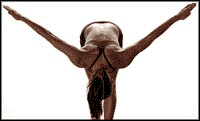|
EXERCISE
MYTHS: HEALTH FACTS ABOUT EXERCISE
|
|
|
|
|
Exercise
Myths
 In
whatever man ventures into he is always
surrounded by myths which are sometimes
imbibed into him from childhood and
sometimes through various other channels.
Here are some of the most common exercise
myths based on current exercise research. In
whatever man ventures into he is always
surrounded by myths which are sometimes
imbibed into him from childhood and
sometimes through various other channels.
Here are some of the most common exercise
myths based on current exercise research.
1. You Will Burn More Fat If You Exercise
Longer at a Lower Intensity.
This is the biggest myths that one has. The
most important focus in exercise is the
amount of fats that you burn while you are
doing that activity. The faster you walk,
step or run, for example, the more calories
you use per minute. However, high-intensity
exercise is difficult to sustain if you are
a beginner or you have not exercised for a
while, so you may not exercise very long at
this level. It is safer, and more practical,
to start out at a lower intensity and work
your way up gradually.
2. If You're Not Going to Work Out
Hard and Often, Exercise Is a Waste of Time.
This kind of thinking keeps a lot of people
from maintaining or even starting an
exercise program. Research continues to show
that any exercise is better than none. For
example, regular walking or gardening for as
little as an hour a week has been shown to
reduce the risk of heart disease.
3. Yoga Is a Completely Gentle and
Safe Exercise.
Well this belief is very wrong. Yoga is an
excellent form of exercise, but some styles
are quite rigorous and demanding both
physically and mentally. As with any form of
exercise, qualified, careful instruction is
necessary for a safe, effective workout.
Some exercises if not continued and abruptly
stopped can cause serious health risks.
4. Regular Exercise Will Help You
Lose Weight Quickly.
This is also a wrong belief. In reality,
genetics play an important role in how
people respond to exercise. Studies have
shown that a group of people who have been
following the same set of exercises response
differently and weight loss is also
different.
5. Exercise Alone Will Keep Your Weight In
Check.
This is the general misconception. Weight
gain or loss is depends on various factors,
including dietary intake and genetics. All
individuals will not lose the same amount of
weight on the same exercise program. It is
possible to be active and overweight.
However, although exercise alone cannot
guarantee your ideal weight, regular
physical activity is one of the most
important factors for successful long-term
weight management.
6. Home Workouts Are Fine, But Going to a
Gym Is the Best Way to Get Fit. Research
has shown that some people find it easier to
stick to a home-based fitness program. In
spite of all the hype on trendy exercise
programs and facilities, the
"best" program for you is the one
you will participate in consistently.
|

|
Exercise
to Keep Fit
We
all know that exercise is the best way to
keep fit. A balanced diet coupled with
regular exercise is all that you require to
be in the best of health and also to keep a
check on your weight. Now there are a few
things that you need to know before going on
a strict exercise routine
How Much Exercise Is Enough?
The most important point that you have to
bear in mind is START SLOW, AND GRADUALLY
WORK UP. Experts recommend that you do 20 to
30 minutes of aerobic activity three or more
times a week and some type of muscle
strengthening activity and stretching at
least twice a week. If that's not possible
then you need to do 30 minutes or more of
moderate-intensity physical activity a day,
at least five times a week.
For beginners and those who have been
inactive for a while, less strenuous
activities such as walking or swimming at a
comfortable pace is advisable. Beginning at
a slow pace will allow you to become
physically fit without straining your body
and putting too much strain on your muscles.
Once you are in better shape, you can
gradually do more strenuous activity.
Does doing regular house-hold chores
benefit my health?
The answer is yes. Regular house-hold chores
can be named as Moderate-intensity
activities which work like gardening,
cleaning the house and other housework.
These activities can be done in short spurts
-- 10 minutes here, 8 minutes there. Alone,
each action does not have a great effect on
your health, but regularly accumulating 30
minutes of activity over the course of the
day can result in substantial health
benefits.
Other
examples of housework that can benefit you
are as under:
- If the
market is at a walking distance then
walk it out instead of taking your car
or cab.
- Rake
leaves
- Play
actively with the kids
- Walk up
the stairs instead of taking the
elevator
- Mow the
lawn
- Take an
activity break -- get up and stretch or
walk around
- Park your
car a little farther away from your
destination and walk the extra distance
What
other exercises are helpful?
Aerobic activity is an important addition to
moderate-intensity exercise. Aerobic
exercise is any extended activity that makes
you breathe hard while using the large
muscle groups at a regular, even pace.
Aerobic activities help make your heart
stronger and more efficient. They also use
more calories than other activities.
Some examples of aerobic activities include:
- Brisk
walking
- Jogging
- Bicycling
- Swimming
- Aerobic
dancing
- Racket
sports
|
|
|
. |
Fat Decimator System By Wes Virgin
Wesley Virgin From Fat Diminisher Is Back And Has Launched His New Weight Loss Offer For 2019!
#1 Health Product For The Year.
 |
|